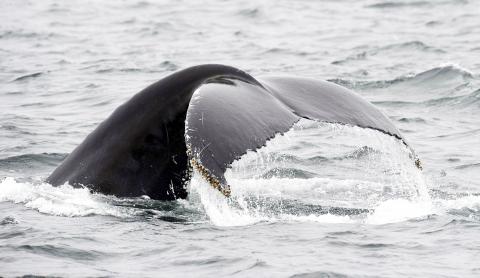Humpback whales love a good hit single, and every year a new catchy pop tune spreads among the male underwater crooners, said an Australian study released on April 14.
The males are the only ones who sing, likely in the hopes of making some lady whale swoon, according to the research published in the US journal Current Biology.
If there is a whale version of the King of Pop, he likely resides off the coast of eastern Australia, because that is where the popular tune of the season has always originated for the past decade, researchers said.

Photo: AFP
照片:法新社
The hit-making tune then ripples eastward across the South Pacific Ocean, from Australia to French Polynesia, infecting genetically distinct groups of whales who all start singing the same song during breeding season.
In typical pop music fashion, the tunes are not all that original most of the time, said researcher Ellen Garland, a graduate student at The University of Queensland.
“It would be like splicing an old Beatles song with U2,” Garland said. “Occasionally they completely throw the current song out the window and start singing a brand new song.”
The 11-year study described itself as the “first documentation of a repeated, dynamic cultural change occurring across multiple populations at such a large geographic scale.”
What remains a mystery is why the whales all sing the same song, when presumably their efforts are meant to make them stand out from the pack.
“We think this male quest for song novelty is in the hope of being that little bit different and perhaps more attractive to the opposite sex,” said Garland.
“This is then countered by the urge to sing the same tune, by the need to conform.”
(AFP)
澳洲四月十四日公布一項研究,座頭鯨喜愛好聽的流行單曲,每年都會聽到海底公座頭鯨群間低吟傳唱一首新的好聽易記的新曲曲調。
根據刊登在美國雜誌《當代生物》的研究報告,只有公鯨吟唱,可能是希望能令母鯨為其傾倒。
研究人員說,若真有鯨魚版流行音樂之王,他可能住在澳洲東部海岸,因為那裡是過去十年來每季流行曲調首聞之處。
一炮而紅的曲調,橫跨南太平洋,從澳洲到法屬玻里尼西亞,向東擴散,影響不同基因的鯨群,在繁殖季期間,吟唱同樣歌曲。
昆士蘭大學研究生艾倫‧賈蘭德說,在典型流行音樂方面,曲調並非一直都只唱原創曲。
賈蘭德說:「它會像一首披頭四曲加入U2的剪輯。」她說,「他們偶爾會全然捨棄目前的歌曲,開始改唱一首全新的曲子。」
耗時十一年完成的研究,形容這項報告是「第一個記載文件,說明生活在如此龐大地理範圍內橫跨許多族群間,週而復始、充滿活力的文化活動。」
研究人員認為鯨群唱歌可能是要從群體裡脫穎而出,但為何這些鯨魚都唱著同一首歌曲,仍是個謎。
賈蘭德說:「我們認為這種雄性鯨魚對新奇歌曲的追求,是希望彰顯其些微的個別差異,或許可能因此更吸引異性。」
她說,「這種求異行為,與鯨群想順應群體而同唱一曲的求同,相互對立。」
(法新社/翻譯:林亞蒂)

In 2024, multiple airplane accidents caused severe casualties, including a Jeju Air disaster at the year’s end. However, not all incidents ended in tragedy. Early in the year, a Japan Airlines flight caught fire after landing in Tokyo, but all 379 passengers and crew members escaped within 90 seconds. This event highlights the “golden 90 seconds” that experts emphasize — most survivors evacuate the plane within this critical window. Proper preparation ensures you can act quickly and decisively during these crucial moments when every second counts. Your survival strategy begins before takeoff. Wear long pants, a comfortable top, and

If you think you’re cool and know all the latest trends, then here’s a question for you: What does the word “brat” mean? If you said something like, “a child who behaves badly or is annoying or rude,” you might not be as hip as you think. This four-letter word now has a new definition that has become quite popular. Its popularity caught the eye of Collins Dictionary, which crowned it as “Word of the Year 2024.” According to this new meaning of brat, it is used as an adjective to describe someone who has a confident, independent, and hedonistic

A: Seeing as the 2025 Michelin Guide extended to New Taipei City and Hsinchu City and County, it’s hard to believe that none of the restaurants won a Michelin star. B: Some fine establishments — like Hsinchu’s A Cut steakhouse — surely deserve the honor. A: Michelin-starred restaurants have good quality food, but some of them are so pricey. B: I once had barbeque pork at a starred restaurant that set me back NT$4,800. That’s even higher than my weekly food budget. A: No wonder several of them have closed down recently, as high prices and the tariff war are scaring off

A: The Michelin Guide Taiwan announced the 2025 Bib Gourmand eateries and starred restaurants last week. B: What were the highlights this year? A: In addition to Taipei, Taichung, Tainan and Kaohsiung, New Taipei City and Hsinchu City and County were included for the first time. B: As a New Taipei resident, I can’t wait to try all the awarded local delicacies. Should we start from the more affordable Bib Gourmand selection? A: Sure, New Taipei and Hsinchu each boast 15 Bib Gourmand eateries now, including some famous establishments such as San Tung restaurant. A: 2025《米其林指南》近日公布「必比登推介」和星級餐廳。 B: 今年的名單有哪些亮點? A: 除了台北、台中、台南、高雄,今年加入新北、新竹縣市! B: 身為新北人,我真想吃遍當地的美食,我們要不要從平價的必比登先開始? A: 好啊新北、新竹各有15家入選必比登,像山東小館等知名餐廳都有上榜唷。 (By Eddy Chang, Taipei Times/台北時報張迪)